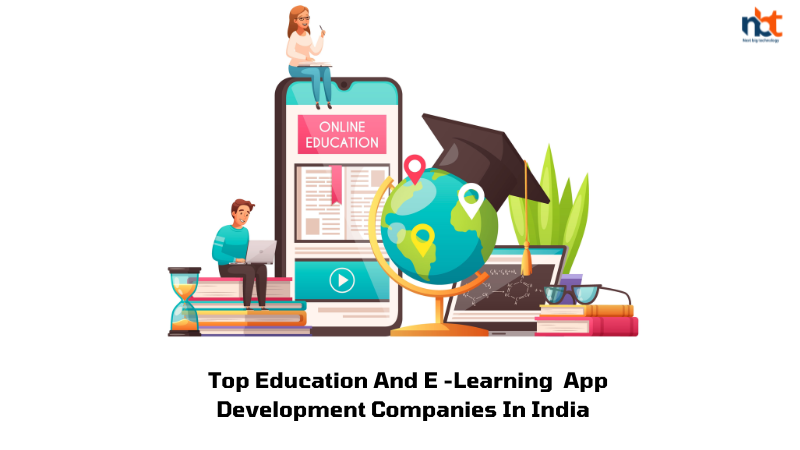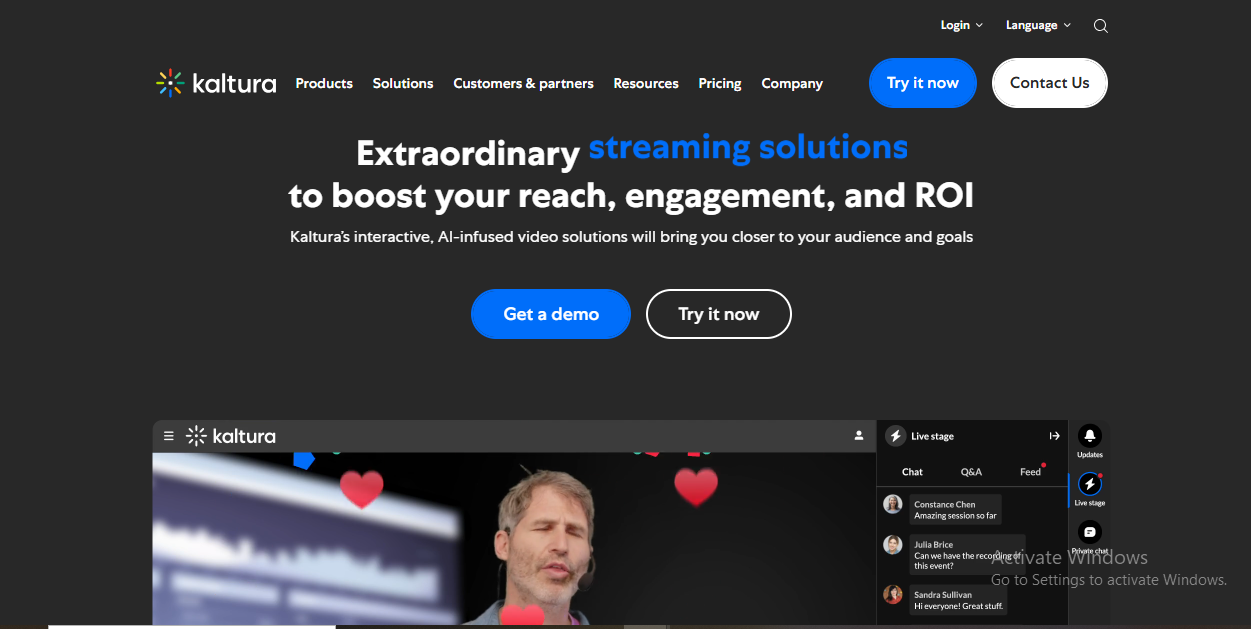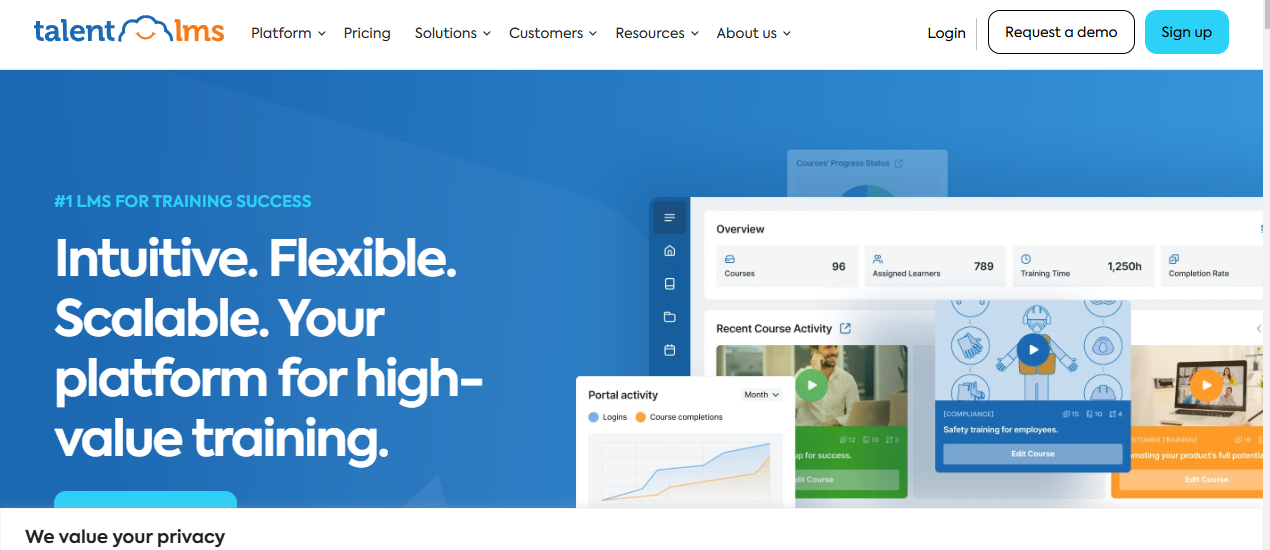This section highlights the leading companies specializing in the development of education and eLearning apps, including Next Big Technology.
Table of Contents
1. Next Big Technology (NBT)
Overview:
- Specialization: Next Big Technology (NBT) excels in creating advanced education and eLearning solutions tailored to educational institutions and organizations.
- Key Services:
- Custom eLearning Platforms: Development of bespoke eLearning platforms with features such as course management, interactive content, and assessments.
- Mobile Learning Apps: Creating mobile applications that provide learning on-the-go with functionalities like offline access and push notifications.
- Integration Services: Seamless integration with Learning Management Systems (LMS), student information systems, and other educational tools.
- UI/UX Design: Designing intuitive interfaces and user experiences that enhance engagement and usability for learners and educators.
- Strengths:
- Innovative Features: Incorporates cutting-edge technologies like AI-driven learning paths and gamification.
- Custom Solutions: Tailored solutions that address specific educational needs and challenges.
- Comprehensive Support: Offers end-to-end services from initial consultation to post-launch support.
2. Kaltura
Overview:
- Specialization: Kaltura offers a comprehensive video platform tailored for education and eLearning.
- Key Services:
- Video Management: Tools for video hosting, streaming, and management.
- Interactive Video: Features such as quizzes and interactive elements embedded in videos.
- Integration: Integration with LMS and other educational platforms.
- Strengths:
- Rich Media Features: Advanced video functionalities and interactive elements.
- Scalability: Suitable for institutions of all sizes with extensive media needs.
3. Blackboard
Overview:
- Specialization: Blackboard provides a leading LMS platform with various tools for education and eLearning.
- Key Services:
- Course Management: Tools for creating, managing, and delivering online courses.
- Collaboration Tools: Features for student-teacher interaction, including discussion boards and messaging.
- Analytics: Data and analytics tools for tracking student performance and engagement.
- Strengths:
- Comprehensive LMS: Robust platform with extensive features for educational institutions.
- Customization: High degree of customization to fit different educational needs.
4. Moodle
Overview:
- Specialization: Moodle is an open-source LMS known for its flexibility and customization in eLearning.
- Key Services:
- Course Creation: Tools for developing and delivering online courses.
- Customization: Extensive plugins and themes to tailor the platform to specific needs.
- Community Support: Active community and extensive documentation.
- Strengths:
- Flexibility: Highly customizable and adaptable to various educational requirements.
- Cost-Effective: Open-source platform with a wide range of features.
5. Edmodo
Overview:
- Specialization: Edmodo offers a social learning platform designed for classrooms and educational collaboration.
- Key Services:
- Classroom Management: Tools for managing assignments, grades, and communication.
- Collaboration Features: Discussion boards, group projects, and messaging.
- Resource Sharing: Integration with educational resources and content.
- Strengths:
- Ease of Use: Intuitive interface and ease of integration into classroom settings.
- Engagement: Features that promote student engagement and collaboration.
6. TalentLMS
Overview:
- Specialization: TalentLMS provides a cloud-based LMS for corporate and educational training.
- Key Services:
- Course Management: Tools for creating, delivering, and tracking training programs.
- Compliance Training: Features for managing compliance and certification.
- Integration: Integration with various third-party tools and platforms.
- Strengths:
- User-Friendly: Intuitive interface and easy setup.
- Versatility: Suitable for both corporate training and educational institutions.
7. Coursera
Overview:
- Specialization: Coursera offers a platform for online courses and certifications in partnership with universities and organizations.
- Key Services:
- Course Delivery: Tools for delivering and managing online courses.
- Certifications: Features for issuing certificates and credentials.
- Analytics: Tools for tracking learner progress and performance.
- Strengths:
- Partnerships: Collaboration with leading educational institutions and organizations.
- Wide Range of Courses: Extensive catalog of courses and specializations.
8. Udemy
Overview:
- Specialization: Udemy provides a platform for creating and selling online courses.
- Key Services:
- Course Creation: Tools for creating and publishing online courses.
- Marketplace: Access to a global marketplace for reaching learners.
- Analytics: Tools for tracking course performance and learner engagement.
- Strengths:
- Flexibility: Platform for both individual instructors and organizations.
- Global Reach: Access to a large audience of learners worldwide.
9. Pluralsight
Overview:
- Specialization: Pluralsight offers a technology-focused learning platform with a wide range of courses.
- Key Services:
- Technical Courses: Specialized courses in technology and IT skills.
- Skill Assessments: Tools for assessing and tracking technical skills.
- Pathways: Learning paths and guided courses for skill development.
- Strengths:
- Focus on Technology: In-depth technical content and courses.
- Skills Development: Features for tracking and improving technical skills.
10. Skillshare
Overview:
- Specialization: Skillshare provides a platform for creative and professional learning through online classes.
- Key Services:
- Class Creation: Tools for creating and sharing online classes.
- Community Engagement: Features for interacting with students and other instructors.
- Analytics: Tools for tracking class performance and learner engagement.
- Strengths:
- Creative Focus: Emphasis on creative and professional skills development.
- Community: Active community of learners and instructors.
How Education and eLearning App Development Companies Work
Education and eLearning app development companies follow a structured approach to create effective and engaging learning applications.
1. Initial Consultation
- Objective: Understand the client’s educational goals and app requirements.
- Activities: Discuss the project’s scope, objectives, target audience, and desired features. Establish timelines and budget expectations.
2. Requirement Gathering
- Objective: Collect detailed information about the app’s functionalities and specifications.
- Activities: Define key features such as course management, assessments, multimedia integration, and user interaction. Document these requirements for the development process.
3. Design Phase
- Objective: Create the visual and interactive design of the app.
- Activities: Develop wireframes and prototypes to outline the app’s layout and user experience. Design the user interface (UI) and user experience (UX) based on client feedback and educational best practices.
4. Development Phase
- Objective: Build the app according to the design and specifications.
- Activities: Code the app, integrate required features such as content management systems, quizzes, and interactive elements. Develop both front-end and back-end components.
5. Testing
- Objective: Ensure the app is functional, secure, and user-friendly.
- Activities: Conduct various tests including functional testing, usability testing, performance testing, and security testing. Identify and address any issues or bugs.
6. Deployment
- Objective: Launch the app and make it available to users.
- Activities: Deploy the app to relevant platforms (e.g., app stores, web platforms). Ensure the app is fully operational and accessible to the target audience.
7. Post-Launch Support
- Objective: Provide ongoing maintenance and support.
- Activities: Offer updates, bug fixes, and enhancements. Monitor app performance and address any issues that arise after launch.
Process of Hiring Education and eLearning App Development Companies
Hiring the right education and eLearning app development company involves several key steps to ensure a successful project outcome.
1. Define Your Project Scope
- Objective: Clearly outline your project requirements and objectives.
- Activities: Document the features and functionalities needed, such as course creation, student management, and assessment tools. Specify your target audience and educational goals.
2. Research and Shortlist Companies
- Objective: Identify potential companies with expertise in education and eLearning app development.
- Activities: Conduct research, review company portfolios, and create a shortlist of firms with relevant experience and positive client feedback.
3. Request Proposals
- Objective: Obtain detailed proposals from shortlisted companies.
- Activities: Send requests for proposals (RFPs) outlining your project requirements. Evaluate proposals based on their approach, timeline, and cost.
4. Evaluate Proposals
- Objective: Assess which company offers the best solution for your needs.
- Activities: Compare proposals based on criteria such as expertise, cost, project timeline, and alignment with your educational goals. Consider how well each company understands your project.
5. Conduct Interviews
- Objective: Gain deeper insights into each company’s capabilities and approach.
- Activities: Interview potential companies to discuss their experience, development process, and project management. Ask about their approach to design, development, and support.
6. Review Contracts
- Objective: Ensure clarity and agreement on project terms.
- Activities: Review and negotiate contracts, including project scope, timelines, deliverables, and payment terms. Ensure all aspects are clearly defined and agreed upon.
7. Make Your Decision
- Objective: Select the best company for your project.
- Activities: Choose the company that best aligns with your requirements, budget, and project goals. Confirm the decision and initiate the project.
How to Find the Best Education and eLearning App Development Company
Finding the best company for developing your education and eLearning app involves evaluating various factors to ensure you make an informed choice.
1. Define Your Needs
- Objective: Clearly understand and articulate your project requirements.
- Activities: Outline the specific features and functionalities you need, such as interactive lessons, progress tracking, and integration with existing systems.
2. Assess Experience and Expertise
- Objective: Evaluate the company’s experience in education and eLearning app development.
- Activities: Review their portfolio of similar projects and assess their technical expertise and industry knowledge. Look for experience with educational technologies and platforms.
3. Check Client Reviews and Testimonials
- Objective: Gauge the company’s reputation and client satisfaction.
- Activities: Read reviews on third-party platforms and request client testimonials. Contact previous clients for their feedback on working with the company.
4. Evaluate Technical Capabilities
- Objective: Ensure the company has the necessary technical skills and resources.
- Activities: Assess their proficiency in technologies relevant to your project, such as mobile app development, LMS integration, and data security.
5. Consider Design and User Experience
- Objective: Ensure the company can deliver a user-friendly and visually appealing app.
- Activities: Review their design portfolio and assess their ability to create intuitive and engaging user experiences for both students and educators.
6. Review Project Management and Communication
- Objective: Ensure effective project management and communication.
- Activities: Evaluate the company’s project management practices and communication protocols. Ensure they provide regular updates and are responsive to your needs.
7. Compare Costs and Value
- Objective: Balance cost with the value offered by the company.
- Activities: Compare pricing models and understand what is included in the cost. Evaluate the overall value based on the services provided and the company’s expertise.
Cost of Hiring Education and eLearning App Development Companies
Understanding the cost structure for hiring education and eLearning app development companies helps in budgeting and financial planning.
1. Factors Influencing Cost
- Project Complexity: More complex projects with advanced features and integrations typically cost more.
- Design and User Experience: Custom designs and enhanced user experience features can increase overall costs.
- Development Time: Shorter timelines or expedited development may result in higher costs.
- Company Expertise: More experienced companies may charge higher rates due to their expertise and track record.
2. Pricing Models
- Hourly Rates: Companies may charge based on the number of hours worked. Rates vary depending on the company and project scope.
- Fixed Pricing: A set price for the entire project, agreed upon in advance. This model is often used for projects with clearly defined requirements.
- Retainer Fees: Ongoing fees for continued support and maintenance after the initial development phase.
3. Additional Costs
- Maintenance and Updates: Ongoing costs for app maintenance, updates, and bug fixes.
- Third-Party Integrations: Costs associated with integrating third-party services or APIs.
- Licensing Fees: Fees for any required software licenses or subscriptions.
All Services Provided by Education and eLearning App Development Companies
Education and eLearning app development companies offer a wide range of services to create, enhance, and maintain educational applications.
1. Custom App Development
- Description: Development of tailored education and eLearning apps to meet specific educational needs, including interactive content, assessments, and student management.
2. UI/UX Design
- Description: Designing user-friendly and engaging interfaces that enhance the learning experience and drive user interaction.
3. LMS Integration
- Description: Integrating with existing Learning Management Systems (LMS) to provide a seamless educational experience and manage course content and student data.
4. Content Management Systems
- Description: Developing systems for creating, managing, and delivering educational content, including multimedia and interactive elements.
5. Mobile Learning Solutions
- Description: Creating mobile applications that allow users to access educational content and participate in learning activities on-the-go.
6. Gamification
- Description: Incorporating game-like elements such as points, badges, and leaderboards to increase engagement and motivation in learning.
7. Assessment and Analytics Tools
- Description: Implementing tools for quizzes, exams, and performance tracking, as well as analytics for monitoring student progress and engagement.
8. E-learning Platforms
- Description: Developing comprehensive platforms for online learning, including course management, student-teacher interaction, and reporting.
9. Integration with Educational Tools
- Description: Integrating with various educational tools and services such as virtual classrooms, collaboration tools, and content repositories.
10. Post-Launch Support and Maintenance
- Description: Offering ongoing support, including updates, bug fixes, and enhancements to ensure the app remains functional and effective.
Why You Should Hire Next Big Technology for Education and eLearning App Development
This section highlights the advantages of choosing Next Big Technology (NBT) for your education and eLearning app development needs.
1. Proven Expertise
- Description: NBT has extensive experience in developing education and eLearning solutions, with a strong track record of delivering successful projects and satisfied clients.
2. Comprehensive Services
- Description: NBT offers end-to-end services, from initial consultation and design to development, integration, and post-launch support.
3. Innovative Solutions
- Description: NBT combines technical expertise with innovative solutions to deliver cutting-edge education and eLearning apps that meet evolving educational needs.
4. Focus on User Experience
- Description: NBT emphasizes creating user-friendly and engaging interfaces that enhance the learning experience and drive student engagement.
5. Reliable Support
- Description: NBT provides comprehensive post-launch support, including ongoing maintenance, updates, and continuous improvement.
6. Competitive Pricing
- Description: NBT offers competitive pricing models tailored to fit various budgets, providing excellent value for their high-quality services.
Hire Top Education and eLearning App Developers
This section provides guidance on hiring the best developers for education and eLearning app projects, focusing on the skills and qualities to look for.
1. Relevant Experience
- Description: Seek developers with proven experience in education and eLearning app development, including relevant projects and technical expertise.
2. Technical Skills
- Description: Ensure developers possess the necessary technical skills, including proficiency in mobile app development, LMS integration, and data security.
3. Portfolio and References
- Description: Review developers’ portfolios and ask for references to assess their previous work and client satisfaction.
4. Communication and Collaboration
- Description: Effective communication and collaboration skills are essential for understanding project requirements and ensuring smooth development.
5. Problem-Solving Abilities
- Description: Evaluate developers’ problem-solving skills and their ability to address complex challenges in education and eLearning app development.
6. Innovation and Creativity
- Description: Look for developers who bring innovative ideas and creative solutions to enhance app functionality and design.
7. Availability and Reliability
- Description: Assess developers’ availability and reliability to ensure they can meet project deadlines and provide consistent support.
FAQ: Top Education and eLearning App Development Companies
This section addresses common questions about hiring education and eLearning app development companies, providing clarity on key aspects.
1. What should I look for in an education and eLearning app development company?
- Answer: Look for companies with experience in education and eLearning app development, a strong portfolio, positive client reviews, technical expertise, and a focus on user experience and educational outcomes.
2. How can I determine the cost of education and eLearning app development?
- Answer: Costs vary based on project complexity, design requirements, and company pricing models. Request detailed proposals and compare quotes to determine the cost.
3. What services do education and eLearning app development companies typically offer?
- Answer: Services often include custom app development, UI/UX design, LMS integration, content management, mobile learning solutions, gamification, and post-launch support.
4. How long does it take to develop an education or eLearning app?
- Answer: Development time varies based on project complexity and scope. On average, it can take several months from initial consultation to launch.
5. How important is user experience in education apps?
- Answer: User experience is crucial for driving student engagement and effective learning. Ensure the development company focuses on creating an intuitive and engaging app interface.
6. What should I expect during the development process?
- Answer: Expect stages including initial consultation, requirement gathering, design, development, testing, deployment, and post-launch support.
7. How can I ensure ongoing support and maintenance for my app?
- Answer: Choose a company that offers comprehensive post-launch support and maintenance services, including regular updates, bug fixes, and performance monitoring.













